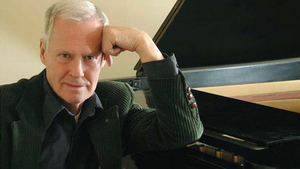Composer Ned Rorem Dies At Age 99
Rorem passed away at age 99 on November 18, 2022 in New York City, in his home on the Upper West Side, surrounded by family and friends.

American composer and writer Ned Rorem passed away at age 99 on November 18, 2022 in New York City, in his home on the Upper West Side, surrounded by family and friends. He is survived by six nieces and nephews and eleven grand nieces and nephews.
Hailed by TIME Magazine as "the world's best composer of art songs," Rorem had an innate ability for syncing music and prosody. His music defied popular serial techniques of the time and garnered wide public reception, winning a Pulitzer Prize in 1976 and a GRAMMY in 1989.
Born on October 23, 1923, in Richmond, Indiana, Rorem was raised a pacifist in the Quaker Society of Friends, but remarked later in life that his family "wasn't concerned with the God part, only with the peace part." At age 10, he began taking piano lessons with Margaret Bonds in Chicago, and at 15, he began studying theory at the American Conservatory with the "Dean of American Church Music" Leo Sowerby.
In 1940, Rorem enrolled at the Music School of Northwestern University, but left after winning a generous scholarship to the Curtis Institute in Philadelphia, which he abandoned to work as a copyist for Virgil Thompson in New York in exchange for $20 and composition lessons. He eventually graduated with a Bachelor's (1946) and Master's (1948) from the Juilliard School of Music, where he studied with Bernard Wagenaar, spent two summers at Tanglewood under the mentorship of Aaron Copland, and was awarded the $1,000 George Gershwin Memorial Prize in composition. In New York, he took piano gigs as an accompanist for Martha Graham and Eva Gauthier.
In May 1949, Rorem, age 25, moved to Paris, the intellectual capital of the world and a city in the midst of reconstruction after World War II. He lived in the region for 8 years, making a two-year detour to Morocco, and continued his studies with Arthur Honegger. He soon entered the patronage of Vicomtesse Marie-Laure de Noailles, whom he described as "George Washington in a Dior gown", and she introduced him to Poulenc, Auric, Milhaud, Cocteau, and all the hip denizens of the Parisian art scene.
Rorem returned to the United States in 1957, settled in Manhattan, and often summered in Nantucket. He was Composer-in-Residence at the University of Buffalo from 1959 to 1961 and the University of Utah from 1966-67. In 1980, Curtis's then-Director John de Lancie asked Rorem to head the composition department, which had been suspended for a number of years, and he taught there until 2003.
Rorem's works span nearly all classical forms and genres. Undoubtedly one of the most prolific artists of his generation, he once remarked, "I can put anything to music, including the encyclopedia." He wrote over 500 songs, sourcing text from some of the most important poets and writers of his day including Gertrude Stein, John Ashbery, Robert Frost, Sylvia Plath, e.e. cummings, Theodore Roethke, Frank O'Hara, and Elizabeth Bishop.
In addition to writing songs, he composed three symphonies, four piano concertos, chamber music for all combinations, eight operas, choral works of every description, ballets, and other music for the theater. In 1976, he won a Pulitzer Prize for Music for his orchestral suite Air Music. His last opera Our Town (2005), with libretto by J. D. McClatchy and the first opera based on Thorton Wilder's play, has been praised for its reflective quality and pragmatic approach to the American classic.
Famous for his controversial diaries, Rorem published sixteen books. He said in a Paris Review interview, "Nine out of ten people who played my music hadn't the faintest idea I wrote books and certainly the people reading the diaries didn't know my music."
He was openly gay at a time when it was against the law in the United States and wrote in his Nantucket diary, "I am a composer, not a gay composer ... Anyone can be gay-it's no accomplishment-but only I can be me." He lived with his partner of over 30 years James Holmes until Holmes's death in 1999.
Rorem was heavily awarded throughout his lifetime. In addition to an array of honorary doctorates, he received a Fulbright Fellowship (1951), a Guggenheim Fellowship (1957), an award from the National Institute of Arts and Letters (1968), a GRAMMY Award for Outstanding Orchestral Recording in 1989, three ASCAP-Deems Taylor Awards, Musical America Composer of the Year (1998), a Gold Medal in Music from the Academy of Arts and Letters (2003; President, 2000-03), and Chevalier de l'Ordre des Arts et Des Lettres by France (2001).
Today we remember Rorem for his far-ranging musical works, his adroit wit, and his bristly pen.
"I don't believe that composers notate their moods, they don't tell the music where to go-it leads them."
Ned Rorem, Lies, 2000
Play Broadway Games
Videos





%20(1024%20×%20512%20px).png)
